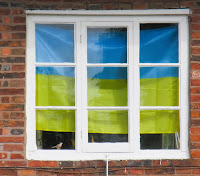Before I found the Isokon Building just down the road, I came across this structure om Haverstock Hill, just south of Belsize Park tube station.
I decided it must be for ventilation, but thought it a bit lightweight if it was intended to ventilate the Northern Line.
When I got home and looked it up, it turned out I was right on both counts. It was for ventilation, but what it ventilated was a deep-level air-raid shelter.
The London Transport Museum has a page about these shelters:
With London suffering major air raids during the Second World War, the London Underground became a natural source of shelter. During the intensive bombing of the Blitz between September 1940 and May 1941, deep-level Tube stations sheltered thousands every night.
With more air raids anticipated and London Transport adept at tunnelling deep underneath London, a clear idea presented itself. The British government commissioned London Transport to build deep-level shelters with the sole intention of protecting civilians. In doing so, London Transport made another major contribution to saving lives in wartime.
On the event, air raids became less of threat in 1942 and 1943, but they came into use in 1944 and when Hitler deployed his V1 flying bombs ('doodlebugs') and V2 rockets.
If you want to know what the shelter was like, then go to the 28 Days Later urban exploration forum. It has photographs from a visit there which show that it is remarkably well preserved.
The shelter tunnels were used for commercial document storage, but I believe they are currently empty. I did wonder if the BT van in my photo is a sign of some new use being made of them.
Incidentally, there was a second access shaft to the shelter - for safety there would have to be - and you can find it on Haverstock Hill north of the station, behind Costa Coffee.




































